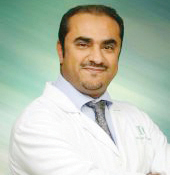MoH runs awareness campaign on bowel diseases
 Dr Saqer Al-Sraye
Dr Saqer Al-SrayeKUWAIT: The ministry of health held an awareness campaign on ulcerative colitis and Crohn's disease from Dec 21 to 28, 2017 at all the public hospitals and some private hospitals. Kuwait Times met Dr Saqer Al-Sraye, Consultant Gastroenterologist at Farwaniya Hospital, who explained this campaign aimed to spread awareness in the community that there are new medications that will improve symptoms and prevent complications.
"The campaign includes awareness of these diseases, their symptoms, the type of inflammatory bowel disease (IBD), when to visit the doctor, what symptoms makes you think that you have an IBD, investigations required for diagnosis of the IBD, pregnancy and IBD, complications of IBD, and most importantly, living a normal life with new treatments of IBD," he noted.
Patient with ulcerative colitis usually suffer from bloody diarrhea, abdominal pain and weight loss. They may also be anemic. "Crohn's disease usually affects the GI track from the mouth to the anal canal, not like the ulcerative colitis that just affects the colon, so Crohn's disease usually results in abdominal pain, weight loss, and sometimes diarrhea or bloody diarrhea. Crohn's disease may also result in complications such as perianal disease, non-healing fistula or recurrent fistula, perianal abscess and non-healing fissure. Intestinal obstruction, intra-abdominal abscess, perforation and peritonitis are other symptoms of this disease," Sraye said.
"Investigations in general require colonoscopy and biopsy, general blood work and imaging. Without proper treatment for IBD, the patient will face a very tough life, and will feel he is not normal compared to the general population, and might have anxiety and depression. So our aim is to let these patients live a normal life with normal life expectancy without complications or symptoms," stressed Sraye.
"Treatment depends on the site of the disease, severity, complications and prior exposure to treatment. The most recent treatment is a biological treatment called 'anti-tumor necrosis factor' (ATNF), where they reduce the symptoms of the disease, improve healing of mucosa and prevent complications to enable a patient to live a normal, happy and productive life," he added.
"If one of the parents has the disease, there is a five percent chance of the offspring to have the disease too. If both of them have it, then there's a 30 percent the offspring might have the disease. The disease is mostly diagnosed in patients aged between 15 to 35 years of both genders," concluded Sraye.
By Nawara Fattahova










